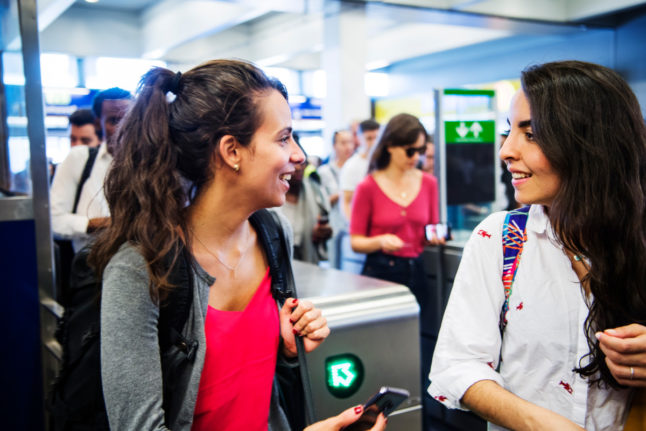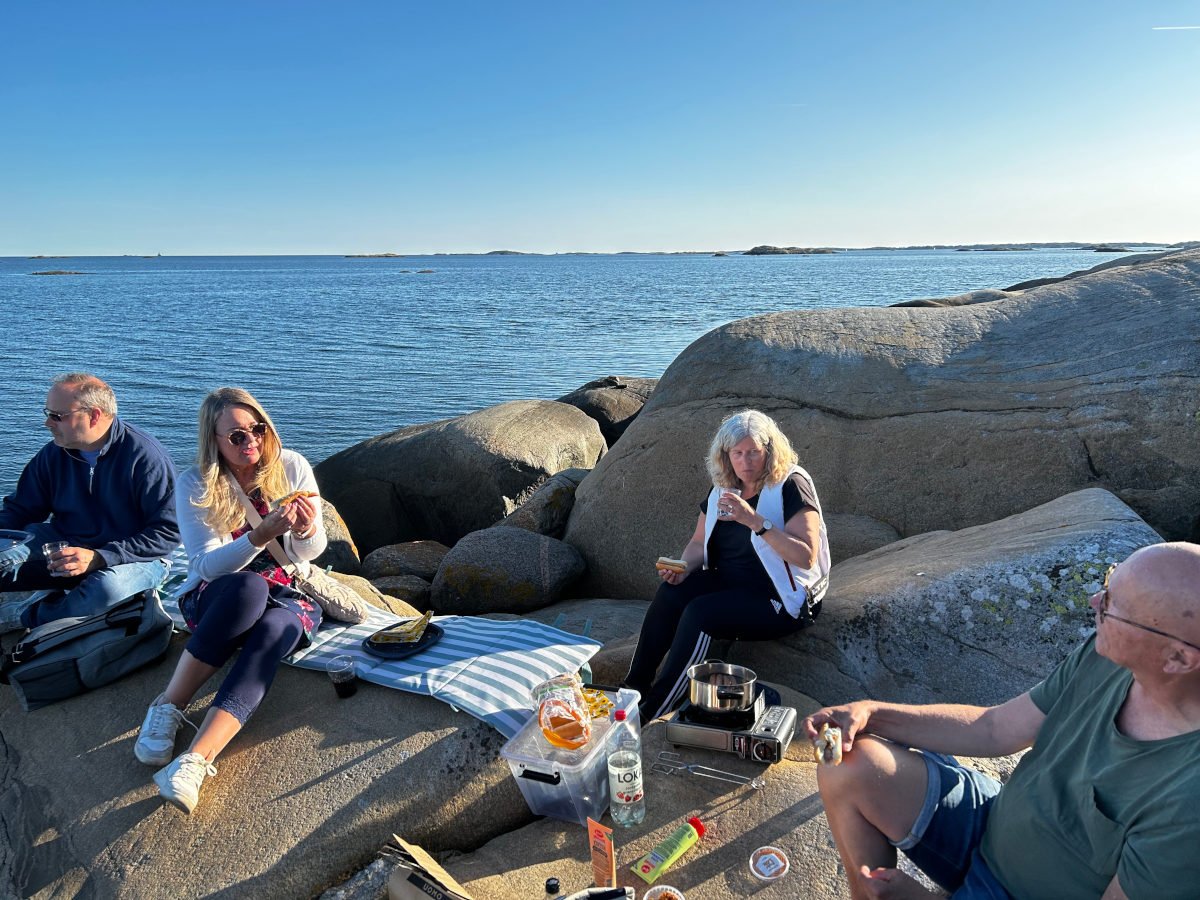Every time I return to the UK from Sweden, I’m astonished by the amount of chit-chat. After ten years living in Sweden, it seems like every interaction with strangers, however small, is punctuated by a short conversation, a joke, a grumble.
This starts from the moment you have your passport checked (“You’ve got your hands full”), to the person sitting opposite you on the train home: (“So, where are you headed?”), to shopkeepers, your taxi driver, and, of course, the semi-intoxicated middle-aged man at the public bar in any pub in the country (any topic you can imagine).
In Sweden, this sort of chat is much, much less common.
Swedes are generally uncomfortable with small talk, which is sometimes even referred to as kallprat (“cold talk”), or even dödprat (“dead talk”).
In many situations, they will experience someone starting a conversation as simply jobbigt (a hassle). More often Swedes avoid small talk out of consideration. If there’s one thing Swedes guard more zealously than their own privacy, it’s the privacy of others. So what feels to foreigners like being cold and unfriendly behaviour is actually a form of thoughtfulness.
But just because small talk is unusual does not mean it doesn’t happen. It is just restricted by a set of informal rules.
In general, speaking to strangers is acceptable under one or more of three conditions: that there are external circumstances that limit how long the interaction can take, that you have something in common with them, that you are both focused on some sort of third element, which dilutes the intensity of face-to-face contact.
READ ALSO: Eight unwritten rules that explain how Swedishness works
Here are the situations when it is permissible to talk to a stranger in Sweden without annoying them:
When they are out walking their dogs
Owning a dog opens up a whole new world of communication in Sweden, so long as you don’t mind all of your conversations revolving around canine husbandry. There’s even a film called Hundtricket (“The Dog Trick”), featuring a young Alexander Skarsgård, in which a man tries to get a girlfriend by buying a dog.
Walking dogs fits all three of the conditions: it is a limited time activity; you are all dog owners, so have something in common; and you have an external thing to focus on (the dogs), that you can engage with if the conversation drops off and becomes awkward.
In a rastplats, or dog park, in a Swedish city, people will go into extraordinary depths about their pets’ breeds, origins, habits, and health problems.
The focus, though, generally stays on the animals. It’s quite common for a dog owner (like this one) to know the names of all the local dogs, but none of the names of their owners.
In time, you might start to ask relatively innocuous questions like whether the other owners left the city on the weekend, or else talk about the weather, but you’re unlikely to ask other dog owners (if they’re Swedish anyway) about their job, or where they come from.
You don’t even need to own a dog to take advantage of Hundtricket. It is quite acceptable to ask strangers about their dogs, even if you don’t have one yourself. Ask about their breed, their age, and perhaps whether you can stroke them.
At the playground with their children
This follows more or less the same rules as the dog park. Parents hovering at the edge of a town or city playground can strike up conversations with one another. This fits two, or perhaps three, of the rules: they have something in common (children), and they have an external thing to focus on (children, again).
The externally set time limit is also there to some extent, as children (in Sweden, as elsewhere) tend to wander off, start crying, or need parental attention, providing the Swede with the required escape route should the conversation become awkward.
When they are having a cigarette break outside
This is the consolation smokers in Sweden receive for their shortened lives.
If a Swedish smoker finds themselves having a cigarette break next to another smoker, they can spark up a short conversation.
The situation meets at least two of the three necessary conditions: the cigarette limits the interaction to about five minutes, and the two Swedes have their unfortunate habit in common.
If the chat becomes uncomfortable one minute in, they can even pretend to be focusing their attention on an external factor: the joy of their cigarette, savouring every drag.
On an organised tour or activity of some kind
If you have signed up for a guided tour of an art gallery, or any sort of time-limited group activity, it’s OK to start a conversation with those on the same tour. This is because the time of the interaction is controlled by the length of the tour, and, perhaps more importantly, you have a third external event to focus on if the conversation gets awkward.
At a concert or football match
This is a bit of a grey zone. But at standing, or occasionally even seated, events where you are there to watch something, it’s more acceptable in Sweden to start a conversation with a stranger. This is partly because you have something external to focus on, but also, I feel, because you are not trapped in the interaction. It is quite possible to move away, ostensibly to find a better angle to watch the performance or game.
When there is a common disaster or disruption
Sparking up a conversation on a long train journey is one of the worst things you can do to a Swede. Even a half an hour journey is too long to count as a real time limit, you have nothing obviously in common, and the circumstances often more or less force you to be aware of one another. Doing this is to condemn the Swede to a painful period of mild awkwardness.
The moment the train is delayed or breaks down, however, everything changes. Suddenly you have something in common, and a lot to talk about. What has gone wrong? Is there anything on SJ’s website? Are you going to make your connecting trains?
Swedes love problem-solving, so the more the disruption involves expertise, the more they are likely to pool knowledge and help each other out.
Swedes don’t tend to complain to the same extent as people in the UK, but if the disruption is long-lasting they might also start to grumble, expressing their dissatisfaction at how they’re been treated. Once the problem is solved, it might then be acceptable to ask a few other questions of the people you’ve been talking to, such as, “where are you off to?”, or “where have you been?”
It’s not just trains.
If a water main bursts on your street and there is terrible flooding, or the power goes off in your apartment building, or the entire street gets parking tickets because of some change in zoning, you might also find strangers in the neighbourhood talking together, sometimes for the first time in years.
In The Local’s offices, a burst water pipe, which flooded the corridor outside the kitchen with foul-smelling water, once led to the first social interactions between us and the Swedes in the surrounding rooms.
“Were you affected?” they asked. “Have you seen the damage on the first floor?”
When there is unusually bad weather
In a sense, this is an extension of the situation above. Swedes do not discuss the weather with strangers in the same way as people in the UK. But if there is a sudden rainstorm that leaves everyone caught in it soaked, or an enormous snow dump that blocks traffic, then you can talk to strangers about the weather and how it has affected you.
Outside of Sweden
Swedes, like people from most other countries, are much more likely to befriend their compatriots when abroad than when at home. When travelling by train from Malmö to Brussels, Swedish families making similar journeys seemed quite happy to strike up a conversation in a way they never would have been on a train from, say, Malmö to Stockholm.
Simply being Swedish, which means nothing at home, qualifies as “something in common” once Swedes are abroad.
At a club or music festival
In bars, pubs and restaurants, Swedes tend to arrive with their friends and limit their conversations to those they already know.
This changes, however, if you’re somewhere where people stand or dance, such as a club or music festival. These places function somewhat closer to the way a concert or a football match does.
Even though there is not always an external factor to focus on, you are at least not trapped at the same table, and it’s always possible to drift on to someone else.
Moreover, clubs in Sweden, as elsewhere, are more or less designed as places for meeting like-minded strangers, meaning the barrier for social interaction is lower.
Everyone is also often drunk, so of course, anything goes.





 Please whitelist us to continue reading.
Please whitelist us to continue reading.
Member comments